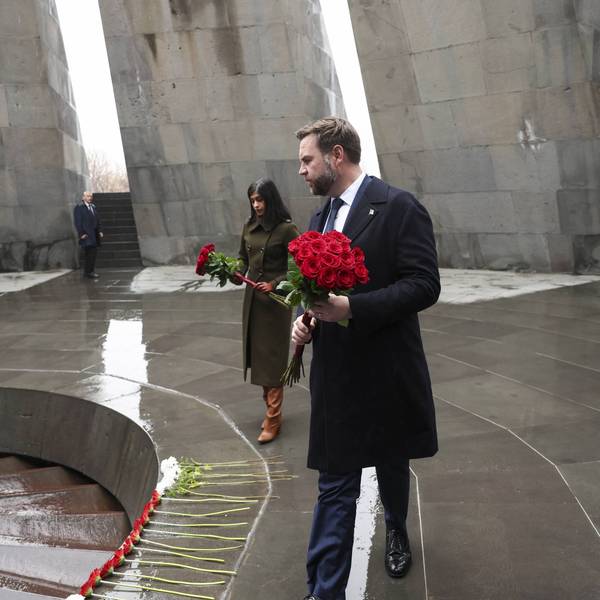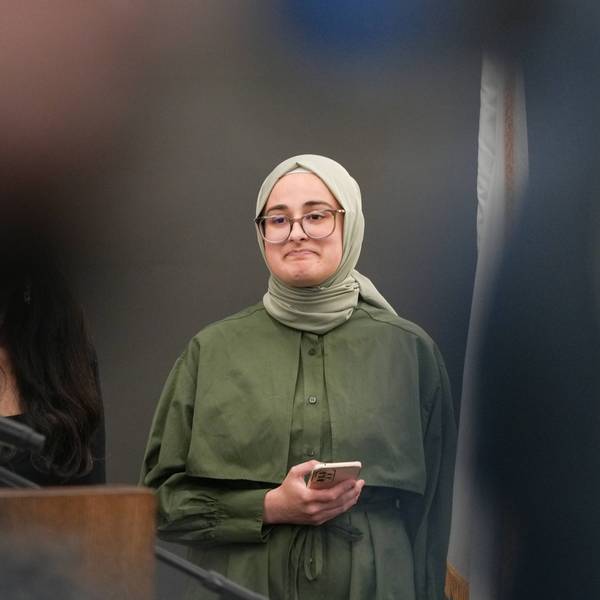Turkish President Continues 'Vicious Campaign' Against Dissidents
President Tayyip Erdoğan wants the country to redefine its anti-extremism law to include journalists, politicians, and academics
Representing a further crackdown on free expression in Turkey, President Tayyip Erdogan said this week he wants the Turkish parliament to redefine the country's anti-extremism law to include journalists, politicians, and academics.
"It is not only the person who pulls the trigger, but those who made that possible who should also be defined as terrorists, regardless of their title," Erdogan said on Monday, one day after a suicide bomb attack in the country's capital of Ankara killed at least 34 people and wounded 125 others.
A legal expert from Turkey's ruling AK Party elaborated to Reuters, saying the government aimed to "broaden the extent" of the anti-terror law.
"A man may not have participated directly in terrorist acts but may have supported them ideologically. This may not be a full terror crime, but a degree of terror crime," the expert said.
Just two days later, three academics who signed a peace petition in January were jailed by an Istanbul court, on suspicion of "making terrorist propaganda."
According to Human Rights Watch, professors Muzaffer Kaya, Esra Mungan, and Kivanc Ersoy were placed in pretrial detention on Wednesday.
The three were among more than 2,000 signatories to a recent petition condemning the Turkish government's security operations against the armed Kurdistan Workers' Party (PKK) youth movement in cities of southeast Turkey because of the disastrous impact on the Kurdish civilian population, which it describes as a "deliberate and planned massacre." Made public at an Istanbul news conference on January 11, the petition also called for a resumption of peace talks with the PKK.
Since the petition's release, police have detained around 15 academics for short periods and in some cases searched their homes and offices, Human Rights Watch says. An Istanbul prosecutor is conducting a criminal investigation into all Turkish signatories on suspicion that they "made terrorism propaganda" and "insulted the Turkish nation or state institutions," while dozes of other academics have been dismissed or suspended by their universities.
"President Erdogan's vicious campaign against the academics is part of his drive to banish, punish, and silence all critical voices in Turkey," said Emma Sinclair-Webb, senior Turkey researcher at Human Rights Watch. "Turkey's universities, prosecutors, and courts should respect and protect free speech and the rule of law by immediately dropping all investigations and punitive measures against all those who signed the declaration."
Earlier this month, a Turkish court approved a government takeover of Feza Media Group that oversees Zaman, Turkey's most widely circulated newspaper; Cihan, a leading news agency; and Today's Zaman, an English-language daily with international reach.
As Amnesty International's Turkey expert Andrew Gardner said at the time, "By lashing out and seeking to rein in critical voices, President Erdogan's government is steamrolling over human rights."
An Urgent Message From Our Co-Founder
Dear Common Dreams reader, The U.S. is on a fast track to authoritarianism like nothing I've ever seen. Meanwhile, corporate news outlets are utterly capitulating to Trump, twisting their coverage to avoid drawing his ire while lining up to stuff cash in his pockets. That's why I believe that Common Dreams is doing the best and most consequential reporting that we've ever done. Our small but mighty team is a progressive reporting powerhouse, covering the news every day that the corporate media never will. Our mission has always been simple: To inform. To inspire. And to ignite change for the common good. Now here's the key piece that I want all our readers to understand: None of this would be possible without your financial support. That's not just some fundraising cliche. It's the absolute and literal truth. We don't accept corporate advertising and never will. We don't have a paywall because we don't think people should be blocked from critical news based on their ability to pay. Everything we do is funded by the donations of readers like you. Will you donate now to help power the nonprofit, independent reporting of Common Dreams? Thank you for being a vital member of our community. Together, we can keep independent journalism alive when it’s needed most. - Craig Brown, Co-founder |
Representing a further crackdown on free expression in Turkey, President Tayyip Erdogan said this week he wants the Turkish parliament to redefine the country's anti-extremism law to include journalists, politicians, and academics.
"It is not only the person who pulls the trigger, but those who made that possible who should also be defined as terrorists, regardless of their title," Erdogan said on Monday, one day after a suicide bomb attack in the country's capital of Ankara killed at least 34 people and wounded 125 others.
A legal expert from Turkey's ruling AK Party elaborated to Reuters, saying the government aimed to "broaden the extent" of the anti-terror law.
"A man may not have participated directly in terrorist acts but may have supported them ideologically. This may not be a full terror crime, but a degree of terror crime," the expert said.
Just two days later, three academics who signed a peace petition in January were jailed by an Istanbul court, on suspicion of "making terrorist propaganda."
According to Human Rights Watch, professors Muzaffer Kaya, Esra Mungan, and Kivanc Ersoy were placed in pretrial detention on Wednesday.
The three were among more than 2,000 signatories to a recent petition condemning the Turkish government's security operations against the armed Kurdistan Workers' Party (PKK) youth movement in cities of southeast Turkey because of the disastrous impact on the Kurdish civilian population, which it describes as a "deliberate and planned massacre." Made public at an Istanbul news conference on January 11, the petition also called for a resumption of peace talks with the PKK.
Since the petition's release, police have detained around 15 academics for short periods and in some cases searched their homes and offices, Human Rights Watch says. An Istanbul prosecutor is conducting a criminal investigation into all Turkish signatories on suspicion that they "made terrorism propaganda" and "insulted the Turkish nation or state institutions," while dozes of other academics have been dismissed or suspended by their universities.
"President Erdogan's vicious campaign against the academics is part of his drive to banish, punish, and silence all critical voices in Turkey," said Emma Sinclair-Webb, senior Turkey researcher at Human Rights Watch. "Turkey's universities, prosecutors, and courts should respect and protect free speech and the rule of law by immediately dropping all investigations and punitive measures against all those who signed the declaration."
Earlier this month, a Turkish court approved a government takeover of Feza Media Group that oversees Zaman, Turkey's most widely circulated newspaper; Cihan, a leading news agency; and Today's Zaman, an English-language daily with international reach.
As Amnesty International's Turkey expert Andrew Gardner said at the time, "By lashing out and seeking to rein in critical voices, President Erdogan's government is steamrolling over human rights."
Representing a further crackdown on free expression in Turkey, President Tayyip Erdogan said this week he wants the Turkish parliament to redefine the country's anti-extremism law to include journalists, politicians, and academics.
"It is not only the person who pulls the trigger, but those who made that possible who should also be defined as terrorists, regardless of their title," Erdogan said on Monday, one day after a suicide bomb attack in the country's capital of Ankara killed at least 34 people and wounded 125 others.
A legal expert from Turkey's ruling AK Party elaborated to Reuters, saying the government aimed to "broaden the extent" of the anti-terror law.
"A man may not have participated directly in terrorist acts but may have supported them ideologically. This may not be a full terror crime, but a degree of terror crime," the expert said.
Just two days later, three academics who signed a peace petition in January were jailed by an Istanbul court, on suspicion of "making terrorist propaganda."
According to Human Rights Watch, professors Muzaffer Kaya, Esra Mungan, and Kivanc Ersoy were placed in pretrial detention on Wednesday.
The three were among more than 2,000 signatories to a recent petition condemning the Turkish government's security operations against the armed Kurdistan Workers' Party (PKK) youth movement in cities of southeast Turkey because of the disastrous impact on the Kurdish civilian population, which it describes as a "deliberate and planned massacre." Made public at an Istanbul news conference on January 11, the petition also called for a resumption of peace talks with the PKK.
Since the petition's release, police have detained around 15 academics for short periods and in some cases searched their homes and offices, Human Rights Watch says. An Istanbul prosecutor is conducting a criminal investigation into all Turkish signatories on suspicion that they "made terrorism propaganda" and "insulted the Turkish nation or state institutions," while dozes of other academics have been dismissed or suspended by their universities.
"President Erdogan's vicious campaign against the academics is part of his drive to banish, punish, and silence all critical voices in Turkey," said Emma Sinclair-Webb, senior Turkey researcher at Human Rights Watch. "Turkey's universities, prosecutors, and courts should respect and protect free speech and the rule of law by immediately dropping all investigations and punitive measures against all those who signed the declaration."
Earlier this month, a Turkish court approved a government takeover of Feza Media Group that oversees Zaman, Turkey's most widely circulated newspaper; Cihan, a leading news agency; and Today's Zaman, an English-language daily with international reach.
As Amnesty International's Turkey expert Andrew Gardner said at the time, "By lashing out and seeking to rein in critical voices, President Erdogan's government is steamrolling over human rights."

